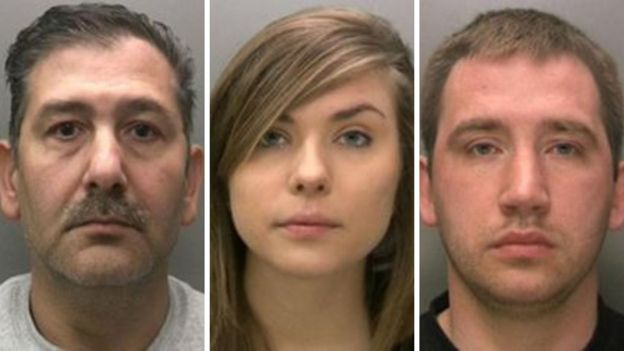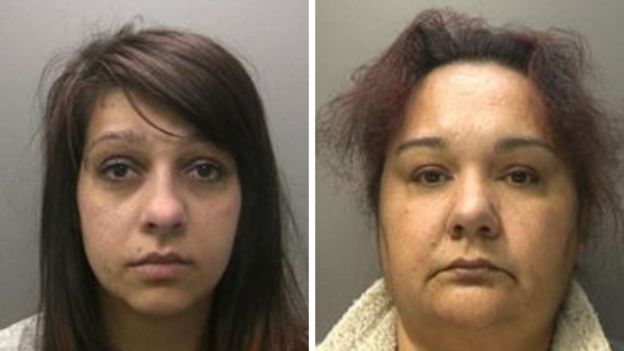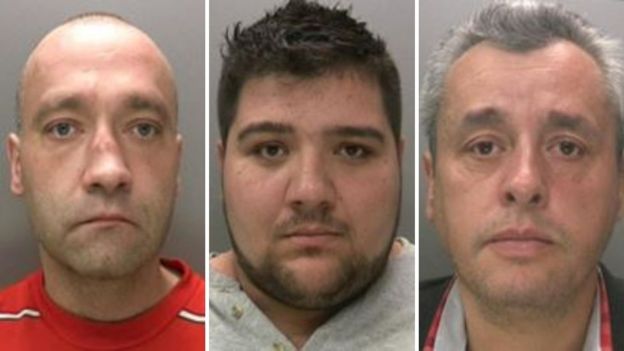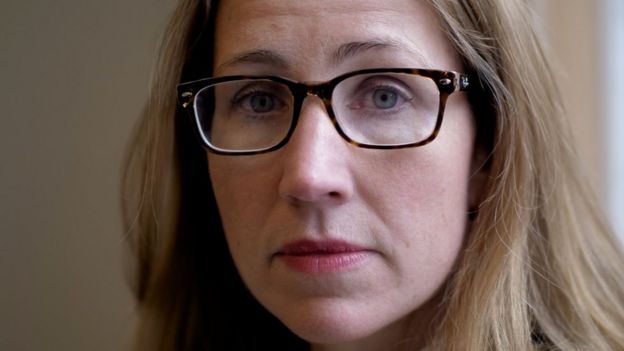
Eight human traffickers have been convicted following the UK's biggest ever modern slavery prosecution.
The traffickers, who were members of a Polish organised crime group, enslaved hundreds of desperate and vulnerable people.
They promised their victims a better life before robbing them - embroiling high street banks, employment agencies and some of Britain's biggest companies in a vast web of criminal exploitation.
Five members of the gang have already been jailed, it can now be reported, and three more will be sentenced later.
BBC Panorama has been following the investigation for two years.
"Worst thing I ever did [was] leaving the Foreign Legion," says Mariusz Rykaczewski. "Two more years and I'd have got a pension."
The former soldier does not look like a victim. But desperate for a way out of Poland, he fell for the false promises of a slave gang.
"I was in trouble with the police," he told Panorama, "I wanted to get away to another country. But I didn't have the money to travel."
He was approached by two men who offered him free travel, housing and work in the UK: "I think, 'it's a joke'," he says. "Then they called me the next day and I thought, 'why not?'''

Marek Brzezinski, Julianna Chodakowicz and Marek Chowaniec (from left to right) were sentenced after the first trial
But once in the UK he was enslaved, robbed, beaten, starved and humiliated.
The gang who exploited him are the largest to have been successfully prosecuted in Europe.
Mariusz waived his legal right to anonymity so he can tell his story. He doesn't want others to suffer as he did.
"I want them to pay for what they did," says Mariusz. "I am not frightened. Not anymore."
It took the police and Crown Prosecution Service nearly four years to bring the case to trial.
Mariusz was one of 66 witnesses to provide evidence to Birmingham Crown Court. Jurors had to consider evidence distilled from 250,000 pages in two cases lasting around six months.
Lead prosecutor Caroline Haughey QC described the investigation as "the largest human trafficking case ever".
"It is taking down a very large organised crime group and gouging out its heart," she says.

Natalia Zmuda and Justyna Parczewska (from left to right) were also convicted in the first trial
The gang are mainly Roma, from Poland. They came to the UK specifically to traffic their fellow countrymen.
Five members were convicted in February, it can now be reported.
Julianna Chodakowicz, 24, Marek Brzezinski, 50, Marek Chowaniec, 30, Justyna Parczewska, 48, and Natalia Zmuda, 29, were sentenced to a total of 39 years - a record for a human trafficking case.
They were jailed for between four-and-a-half and 11 years.
A further three traffickers: Ignacy Brzezinski, 53, Jan Sadowski, 28, and Wojciech Nowakowski, 42, have now also been convicted and will be sentenced later.
Brzezinski and Nowakowski were both found guilty of modern slavery offences, while Sadowski admitted his part on the first day of trial.
As well as exploiting the slaves for labour, the gang used their identities to commit both benefit and bank fraud.
"The multiplicity of criminality is extraordinary," says Ms Haughey. "The victims are there to be exploited in any way they can be."
"The predominance of our complainants are homeless, financially impecunious, desperate for security. Many have mental health problems. Many are alcoholics or drug addicts."

Wojciech Nowakowski, Jan Sadowski and Ignacy Brzezinski (from left to right) were convicted following the second trial
The traffickers enticed victims to the UK with bus tickets and the promise of well-paid work.
Once here they were taken to squalid terraced houses in West Bromwich and Birmingham. They were held, jobless, under guard for weeks while the debts piled up.
Every cigarette, every bit of stale food they were given was added to the tally. Slowly, steadily, they were ensnared.
"That is the isolation phase," says Detective Chief Inspector Nick Dale. "Later, there are threats. The feeling that the traffickers are all-seeing: 'If they leave the house we will find you; you'll go to the woods, and we'll dig a hole'."
Police evidence photos showed mattresses that looked as if they have been dragged in off the street for slaves to sleep on. Their rooms were cramped and filthy.
"One man described washing with canal water," says Ms Haughey. "Others described eating out of skips because the food was so bad. It's heart-breaking."
Mariusz says the traffickers also supplied the slaves with drink, plunging them further into debt and making the victims more compliant.
"It was always noisy in the house, crazy," he recalls. "There was no place you could go. And they were always watching you."

Lead prosecutor Caroline Haughey QC described the investigation as 'the largest ever human trafficking case'
Jurors heard how traffickers placed moles inside employment agencies so they could get their slaves into work.
Julianna Chodakowicz was employed by E-Response in Worcestershire. It supplied 23 workers to a fencing company that supplies major DIY retailers.
Chodakowicz had been in a relationship with another member - Marek Chowaniec - who brought slaves into the country.
The well-ordered hierarchy Chowaniec worked to, included family head Ignacy Brzezinski and Justyna Parczewska - the gang's matriarch.
When a slave died of natural causes, she ordered a gang enforcer to empty his pockets before calling the authorities.
The rest of those convicted were minders and so-called "foot soldiers" who controlled slaves in the houses.
"Every day we travelled 90 minutes to work. I was picking vegetables in the rain," says Mariusz.
"No toilet facilities, no shower in the house. On Friday, the trafficker comes round and pays me - sometimes £40, sometimes £25. The most I got was £75.
"The traffickers opened bank accounts in everybody's name - with an address they control."
Many of the slaves were forced to open multiple accounts. Detectives identified a total of 81. These were regularly emptied by the traffickers.
CCTV obtained by the police shows gang leaders making multiple withdrawals using a stack of bank cards. When Mariusz complained to his captors, the response was violent.
"They beat me," he says. "Punched and kicked me. Broke my ribs. Gave me black eyes. I slept with a knife under my pillow in case they came again."
Desperate to escape, Mariusz got a number for the Salvation Army slavery helpline. It hums around the clock, taking calls from the victims of modern slavery. Staff are trained to help people break free.
"The woman, she told me what to do," says Mariusz.
"One night I just left the house and ran to the nearest police station."
Mariusz was interviewed and taken to a Salvation Army safe house. The charity has a government contract to help slaves and rehabilitate them.
Last year it cared for 3,354 people. The numbers it deals with have risen every year for the past seven years.
The Salvation Army and anti-slavery charity, Hope for Justice, work closely with the police.
One of its workers noticed that many men were turning up at its soup kitchen in West Bromwich with the same story as Mariusz.
"We started rescuing them one by one," says Kevin, a former detective working with the charity.
"We arranged rendezvous points close to where they were living and picked them up. They were all terrified."
Police video interviews with the escaped slaves capture their terror. One after another they describe beatings, exploitation and humiliation.
The only woman known to have been enslaved by the gang sits in a red parka, her arms clamped between her legs, as she relates a trafficker's threat to her: "He said, 'I will break your bones'," she tells detectives. He also threatened to sell her into prostitution if she refused to comply.
The striking thing about all of the accounts is how similar they are.
"The stories sit on top of one another in layers," says Ms Haughey. "There are thousands upon thousands of documents in this case, but they tell a single story."
In spite of the successful prosecutions, DCI Dale warns that it would be wrong to imagine that the conviction of this gang brings the problem to an end.
"We cannot police it out of existence," he says. "We need the public, employers and banks to act if they see something suspicious. Not to turn a blind eye. '
Mariusz's evidence was crucial to these prosecutions. But things have not ended well for the former Foreign Legionary.
The crime that drove him into the traffickers' arms has finally caught up with him. Hearing he was in the UK, Polish prosecutors issued a European Arrest Warrant for him.
He has now been deported to Poland to serve a year-long sentence.
"It's okay. I have been through worse," he told the programme, on the day of his extradition. "I will be fine."